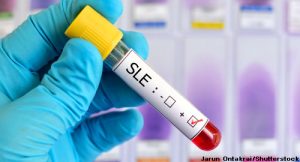 Early Data Show Promise for CAR T Cell Therapy in SLE & Beyond
Early Data Show Promise for CAR T Cell Therapy in SLE & Beyond
SAN DIEGO—At a Nov. 14 session of ACR Convergence 2023, Georg Schett, MD, presented updated experimental data demonstrating remarkable and durable efficacy for chimeric antigen receptor (CAR) T cell therapies in systemic lupus erythematosus (SLE), autoinflammatory myositis and systemic sclerosis.1
Background
CAR T cell therapies are cellular therapies, genetic therapies and immunotherapies. T cells collected from a patient’s blood are genetically engineered to express CARs that can bind to a B cell marker, such as CD19. After the patient receives chemotherapeutic agents for lymphodepletion, these CAR T cells are reinfused into the patient and—because they are targeted at CD19—they kill B cells.2
In relapsed or refractory B cell cancers, CAR T cell therapies directed at B cell antigens have led to profound, long-lasting responses in many patients. Six CAR T cell therapies are now approved by the U.S. Food & Drug Administration (FDA) for treating patients with blood cancers, but none is approved for patients with an autoimmune condition.
Due to the underlying pathophysiology of certain autoimmune diseases, such as SLE, scientists have long been interested in B cell depletion as a treatment approach. However, clinical trials of rituximab, a monoclonal antibody depleting B cells, proved disappointing. Its effects are far from curative, and rituximab is only approved for off-label use in this context.2
SLE, Myositis & Systemic Sclerosis

Dr. Schett
Dr. Schett is head of the Department of Medicine 3 (Rheumatology and Immunology) of the Friedrich-Alexander University Erlangen-Nürnberg, Germany. In September 2022, he and colleagues published results from a compassionate-use study of anti-CD19 CAR T cell therapy, which generated much interest. The team reported on five patients with severe SLE who were refractory to several immunosuppressive treatments. In an average of eight months after receiving CAR T cell therapy, all patients maintained complete remission, with no continued immunosuppressive treatments.1
In May 2023, the team published updated their findings with data on seven SLE patients followed for a median of 13 months who showed continued response and remission.3 The group has also published reports of single patient case studies in severe systemic sclerosis and inflammatory myopathy with antisynthetase syndrome.4,5
Patient Results
During the session, Dr. Schett shared additional data on these patients and some new ones, for a total of eight patients with SLE, three with myositis and four with systemic sclerosis. All these patients have shown a durable resolution of their symptoms, and none is currently taking glucocorticoids or immunosuppressives of any kind.

